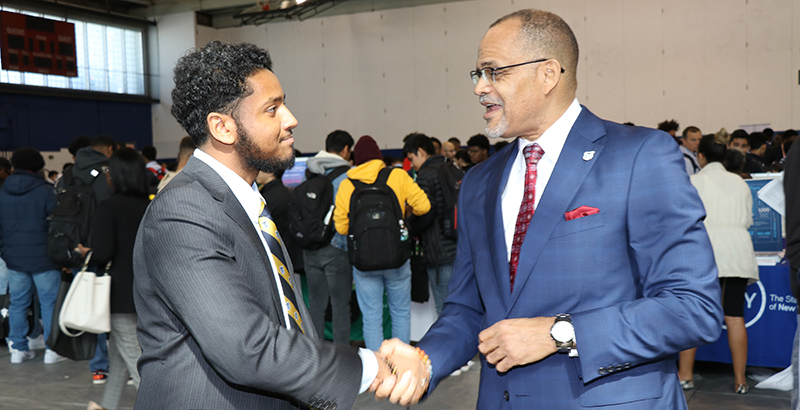‘The Right Choice for this Historic Moment’: David Banks’s Appointment to NYC Schools Chancellor Welcomed in Several Circles

Get stories like these delivered straight to your inbox. Sign up for The 74 Newsletter
New York City Mayor-elect Eric Adams on Thursday named one of his most trusted advisors, insider David Banks, to oversee the country’s largest school system as it moves to recover from the pandemic’s unprecedented disruption to learning.
Banks is the founding principal of the Eagle Academy for Young Men, an all-boys college preparatory school he established in the Bronx in 2004 to improve the graduation rates and outcomes of students of color. He is now the president and CEO of the Eagle Academy Foundation, which supports the public school network since grown to six schools, one in every borough and another in Newark, New Jersey.
Banks accepted the chancellor appointment, considered the second-most consequential education job in the country after U.S. education secretary, while standing in front of his own elementary school in the Crown Heights section of Brooklyn.
“I’m deeply humbled to have the opportunity to lead the school system that shaped who I am today,” he said on Twitter. “To every parent, student, educator, school administrator, support staff member, educational partner, I see you.”
Banks’s selection appears to represent a clear shift away from the educational philosophy of outgoing Mayor Bill de Blasio, who was closely aligned with the United Federation of Teachers for much of his two terms and who was antagonistic toward charter schools. In contrast, both Adams and Banks have expressed support for charters, which are public schools that are independently run and typically non-union.
Through a spokesperson, Eva Moskowitz, an outspoken de Blasio foe who runs the high-performing Success Academy charter school network, said, “David cares deeply about kids and educators, and will stop at nothing to ensure children have great schools, whatever form that takes, district or charter.”
Banks chose Daniel Weisberg, who frequently battled with the teachers union as a labor strategist under former Mayor Michael Bloomberg, as his first deputy. His appointment could send a signal that the new administration might be eager to root out lackluster teachers and ineffective administrators.
Chris Cerf, who also served in the Bloomberg administration as a DOE deputy chancellor, called Banks “the right choice for this historic moment” Thursday, saying he understands the byzantine nature of the department. But there is another, perhaps even more important reason Cerf believes Banks is ideal for the post, he said.
“If you know David, you know he really deeply believes … in the core purpose of public education, to do everything we can to ensure every child, regardless of birth circumstances or demographics, is given an equal opportunity to succeed in life,” said Cerf, a former New Jersey state education commissioner and Newark schools superintendent. “He understands the urgency of that, the steepness and the mountain that still needs to be climbed.”
Paula White, executive director of Educators for Excellence New York, a teacher advocacy group, was also excited by Banks’s appointment.
“When you look at the trajectory of his career, it’s clear he has been an advocate for underserved children and that he has also been a little ahead of his time in terms of really a focus on a holistic notion of what it means to educate Black and brown students well,” White said.
She said many educators in recent years have fallen into one of two camps: The first acknowledges that Black and brown children often face adversity and pledges to both provide them with social-emotional support and adjust their expectation of these students.
The second, no-nonsense camp, she said, employs a more regimented approach and leaves students on their own in addressing their challenges. Banks does not fit into either category, she said.
“With the Eagle Academy, you saw a much more nuanced way of thinking about that,” White said, adding it held onto the rigor while also fostering students’ own sense of agency. “Him having done that at a time when there wasn’t much of a messy middle speaks to who he is — and is very encouraging.”
Banks’s appointment comes after nearly two years of pandemic-related turmoil, including much back and forth with union leaders about school re-openings and mask and vaccine mandates — and a massive drop in enrollment as some families moved from the district, placed their children in private schools or opted for homeschooling.
Adams, in a Tweet, spoke of upcoming change, though he has been tight-lipped about firm plans, saying only, “Right now, we have a once-in-a-generation opportunity to reimagine our education system to fix the entrenched inequalities that hold too many children back.”
City schools are struggling with narrowing the achievement and opportunity gaps, both made worse by the ongoing pandemic with poor children, students of color, English learners and disabled students facing the greatest challenges.
Adding to a long list of woes, more than 101,000 New York City school children lived in shelters or suffered unstable housing during the 2020-21 school year, marking a 42 percent increase since the start of the decade, according to Advocates for Children of New York.
Cerf believes Banks will focus on providing students with at least some career training, critical to their success later in life: One of his key goals is to expand opportunities for children who otherwise might be stuck in poverty.
“He very much understands that by the time a child gets to kindergarten, there is a lot that has already been established in terms of that child’s ultimate learning trajectory,” Cerf said. And he’ll care, too, about what parents want for their kids. At Thursday’s press conference, Banks pledged to never make a major decision without community support.
Brooklyn mother Natasha Capers has been the director of the NYC Coalition for Educational Justice for seven years. Capers, who opposed school closures carried out by the Bloomberg administration, called Banks’s appointment a historic moment, noting this is the first time a Black New York City mayor has appointed a Black chancellor.
Capers said she believes Banks will further the Department of Education’s recent mission to move toward equity, citing its announcement earlier this year that it would create a new, culturally responsive curriculum.
“That’s really big,” she said, adding that it aligns with Banks’s values and experience and the tactics he employed at Eagle Academy. “We have someone at the helm who can say, ‘Yes, I know this type of approach works.’”
Banks recently collaborated with Scholastic to curate the Rising Voices Library, a collection of books for K-5 students featuring inspiring narratives and protagonists who are young men of color.
“I know how the literature of writers and great leaders of color like Frederick Douglass, Paul Robeson, Phillis Wheatley and Malcolm X impacted my life,” Banks wrote in a 2020 essay for The 74. “As a young man, I was forever changed by their scintillating prose, their brash, daring ideas, and the fact that these men and women wrote about people like me and shared dimensions of my experience as an African American,. All students deserve access to diverse literature, and I have sought to provide that throughout my time as an educator.”
Banks called the Rising Voices Library a “landmark in the movement for culturally relevant curricula.” That movement is now under siege in many U.S. schools with battles erupting over diversity and inclusion and how race and history are taught.
Banks will replace Meisha Ross Porter, who once worked for him in the Bronx and became the first Black woman to lead New York City public schools. Porter, a product of the school system she came to oversee, was named chancellor after Richard A. Carranza left the post in March 2021.
In a brief statement, Michael Mulgrew, president of the United Federation of Teachers, said Banks cares deeply about children.
“We have worked well with David in the past, and we look forward to continuing that relationship as he takes on the challenge of running 1,600 schools still suffering from the effects of the pandemic,” Mulgrew said.
Nicole Brennan, a teacher for 15 years in Queens, said she didn’t know enough about Banks to determine whether he could help her second-graders. She’s not sure how to turn around schools after the damage done by the pandemic, only that she needs more time with her students — and far less paperwork.
“It seems like every few years … there are different mandates, responsibilities added to our plate, yet we are never given the time to do them,” she said. “I’ve seen things come and go and come back again with the same thing labeled a different way every couple of years. At this point, our older, veteran teachers just nod and smile and try to do what is best for the student.”
Get stories like these delivered straight to your inbox. Sign up for The 74 Newsletter

;)
